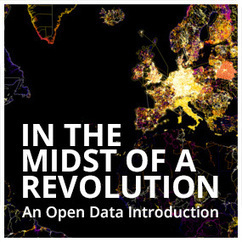 Your new post is loading...
The commons – as a constellation of specific projects, a transnational network, and a discourse that makes bracing moral and political claims -- is on the rise. It can be seen in renewed interest in classical commons such as farmland, fisheries, forests and water as well as in efforts to build communities around shared digital resources and re-imagine governance of city resources as commons, among many other initiatives. Much of the focus of commons is not on the resource alone, but on the social practices and norms of working together in equitable ways for shared ends, often known as “commoning.”
Official Full-Text Publication: Combining internal and external motivations in multi-actor governance arrangements for biodiversity and ecosystem services on ResearchGate, the professional network for scientists.
Summary: This paper analyzes the extent of income inequality from a global perspective, its drivers, and what to do about it. The drivers of inequality vary widely amongst countries, with some common drivers being the skill premium associated with technical change and globalization, weakening protection for labor, and lack of financial inclusion in developing countries. We find that increasing the income share of the poor and the middle class actually increases growth while a rising income share of the top 20 percent results in lower growth—that is, when the rich get richer, benefits do not trickle down. This suggests that policies need to be country specific but should focus on raising the income share of the poor, and ensuring there is no hollowing out of the middle class. To tackle inequality, financial inclusion is imperative in emerging and developing countries while in advanced economies, policies should focus on raising human capital and skills and making tax systems more progressive.
This paper explores the notion of digital non-participation as a form of mediated political action rather than as mere passivity. We generally conceive of participation in a positive sense, as a means for empowerment and a condition for democracy. However, participation is not the only way to achieve political goals in the digital sphere, and can be hampered by the “dark sides” of participatory media, such as surveillance or disempowering forms of interaction. In fact, practices aimed at abandoning or blocking participatory platforms can be seen as politically significant and relevant. We propose here to conceptualize these activities by developing a framework that includes both participation and non-participation. Focusing on the political dimensions of digital practices, we draw four categories: active participation, passive participation, active non-participation, and passive non-participation. This is not intended as a conclusive classification, but rather as a conceptual tool to understand the relational nature of participation and non-participation through digital media. The evolution of the technologies and practices that compose the digital sphere forces us to reconsider the concept of political participation itself.
While university presidents learn that their funding is to be reduced by EUR 400 million, the Ministry of Research has decided, under great secrecy, to pay EUR 172 million to the world leader in scientific publishing Elsevier .
On July 9th, Prime Minister Matteo Renzi inaugurated Italy’s 6 month Presidency of the European Council, calling for a bold new plan to create “Digital Europe.” The Prime Minister and Neelie Kroes, Vice President of the European Commission and the Commissioner for the Digital Agenda, hosted a conference of leading CEOs from across Europe in Venice, and issued “The Venice Declaration” to bring the EU into the digital age. Jeremy Rifkin was asked to deliver the keynote address.
This chapter is divided into three main sections. The first discusses the political environment in China to provide the context for dissent and involves a broad stroke on neoliberalism in China with a further discussion on censorship and control in
Through the Arab Spring and the Occupy movement, the idea of horizontal, leaderless organization has come to the attention of the mass media. In this article we explore radical, participative-democratic alternatives to leadership through an empirical study of four Social Movement Organizations (SMOs). Whilst there has been some writing on leadership within SMOs, it has mirrored the ‘mainstream’ assumption that leadership is the product of individual leaders possessing certain traits, styles and/or behaviours. In contrast, critical leadership studies (CLS) recognize that leadership is a relational, socially constructed phenomenon rather than the result of a stable set of leadership attributes that inhere in ‘the leaders’. We utilize this framing to analyse how leadership is understood and performed in anarchist SMOs by examining how actors manage meaning and define reality without compromising the ideological commitments of their organizations. Furthermore, we also pay attention to the organizational practices and processes developed to: (a) prohibit individuals from permanently assuming a leadership role; (b) distribute leadership skills and roles; and (c) encourage other actors to participate and take-up these roles in the future. We conclude by suggesting that just because an organization is leaderless, it does not necessarily mean that it is also leadershipless.
So what does the evidence about citizen engagement say? Particularly in the development world it is common to say that the evidence is “mixed”. It is the type of answer that, even if correct in extremely general terms, does not really help those who are actually designing and implementing citizen engagement reforms.
Abstract: This paper examines coordination in transparent work environments - environments where the content of work artifacts, and the actions taken on these artifacts, are fully visible to organizational members.
This paper is an expansion of some of the central ideas that were articulated by Emanuel Pastreich and Layne Hartsell in an article published in Foreign Policy in Focus in September, 2013 concerning the response to the meltdown of three reactors at the Fukushima Daiichi Nuclear Power Plant. The article, titled “The Century-Long Challenge to Respond to Fukushima,” called for an international collaborative response to the ecological, social and economic crisis left to the world after the disaster of March, 2011.
"As our current system based on a growth-extraction spiral is leading us into the wall, we are seeing a multitude of innovative local solutions to local problems with people taking things inventively into their hands to construct alternatives in
Throughout the resistance gardens, a lifestyle is establishing itself, not only in regard to the issue of the garden, but in a general way, to the relationship between a man and his socio-biological environment where, according to the standards of the Garden Movement, the living economy consists in doing as much as possible with as little as possible against the existing energies. This applies to daily activities in every domain. The expansion of the concept of resistance is possible on all levels. However, it is necessary to stay in permanent alert in order to avoid confusing consumerism flow, ideals of development and misleadings with ecology – Gilles Clément
|
The Internet of Communities (IoC) is a vision of a social Web willfully designed to maximize social engagement by introducing a new set of collective incentives. First, the IoC aims to explore how collective reputation can be used as a catalyst to regulate social interactions. Secondly, the IoC promotes internally rewarding incentives rooted in positive emotions and in reciprocity to spark social engagement without the prior need to mobilize financial assets. Collective reputation is chosen as a means for collective governance and internally rewarding incentives are chosen as the prime motive for action. Within this scheme, influence is more likely to shift to those who positively impact their communities, to those who lead by example, and to those who reciprocate with fairness. Grounded in personal fulfilment and in social empowerment, the IoC is therefore an attempt to actualize greater human, social and economic value from online communities. Read our white paper.
TL;DR — On a Friday in 2005, the Los Angeles Times launched an experiment: a “wikitorial” on the Iraq War that any of the paper’s readers could edit. By Sunday,
“In September 2014, the Commons Strategies Group convened a three-day workshop in Meissen, Germany, of 25 policy advocates and activists from a variety of different economic and social movements. The topic of the “deep dive”: Can leading alt-economic and social movements find ways to work more closely together? Can there be a greater convergence and collaboration in fighting the pathologies of neoliberalism?”
Sharing economy practices have become increasingly popular in the past years. From swapping systems, network transportation to private kitchens, sharing with strangers appears to be the new urban trend. Although Uber, Airbnb, and other online platforms have democratized the access to a number of services and facilities, multiple concerns have been raised as to the public safety, health and limited liability of these sharing economy practices. In addition, these innovative activities have been contested by professionals offering similar services that claim that sharing economy is opening the door to unfair competition. Regulators are at crossroads: on the one hand, innovation in sharing economy should not be stifled by excessive and outdated regulation; on the other, there is a real need to protect the users of these services from fraud, liability and unskilled service providers. This dilemma is far more complex than it seems since regulators are confronted here with an array of challenging questions: firstly, can these sharing economy practices be qualified as "innovations" worth protecting and encouraging? Secondly, should the regulation of these practices serve the same goals as the existing rules for the equivalent commercial services (e.g. taxi regulations)? Thirdly, how can regulation keep up with the evolving nature of these innovative practices? All these questions, come down to one simple problem: too little is known about the most socially effective ways of consistently regulating and promoting innovation.
In this paper we look at how information in societies is organized and how power relationships arise as a consequence of this organization. We argue that many of the observed information asymmetries are not happenstance and, drawing from a wealth of scholarship from the economics and finance literature, we posit that outcomes are inevitably detrimental. The paper concentrates on the techniques that foster information imbalances, such as media and propaganda, knowledge production, educational systems, legal and organizational structures, exclusive information networks, and surveillance. We conclude that in the absence of greater transparency, the deleterious effects of unequal access to information will continue and deepen.
Alternative currencies are types of money or exchange that can be used instead of and alongside national currency. A number of alternative currencies are used in the UK today. This POSTnote outlines the different types and aims of these currencies. It also sets out how alternative currencies are being used and highlights regulatory and policy challenges regarding consumer protection, financial crime and taxation and benefits.
In an increasingly unequal and unsustainable world, governments must urgently move beyond the restrictive political and economic ideologies of the past and embrace solutions that meet the common needs of people in all countries. This primer outlines the extent of the interconnected global crises we face, and points the way towards an alternative approach to managing the world’s resources based upon international cooperation and economic sharing.
In an increasingly unequal and unsustainable world, governments must urgently move beyond the restrictive political and economic ideologies of the past and embrace solutions that meet the common needs of people in all countries. This primer outlines the extent of the interconnected global crises we face, and points the way towards an alternative approach to managing the world’s resources based upon international cooperation and economic sharing.
The technological development of open source three-dimensional (3D) printers is creating more affordable Additive Manufacturing (AM) machines for society in different applications. For this reason, the machines’ capability should be evaluated in order to establish minimum standards of performance. This paper deals with the development, manufacture and testing of a geometrical benchmarking model (GBM) in order to evaluate the geometrical accuracy performance of open source 3D printers. The methodology is demonstrated with a case study based on fused deposition modelling (FDM). The case study positions the evaluated machine according to ANSI-ISO's International Tolerance (IT) Grades. Furthermore, root-mean-square deviation (RMSD) value is employed as an accuracy estimator, while Taguchi tools are employed to determine the control factors with the highest accuracy for the fabrication of the GBM.
"In this interview, Jose Luis Vivero makes a strong case for a narrative shift in the way we all perceive food: from being merely a commodity whose utility has to be maximized by all means towards the valuation of all food dimensions and its
Through the case of the RepRap-based, Lego-built three-dimensional (3D) printing-milling machine, this paper sets out to discuss and illustrate two points: First, on a theoretical level, that modularity, not only in terms of development process but also of hardware components, can catalyze Commons-based peer production’s (CBPP) replication for tangible products enabling social experimentation and learning. Second, the hybrid 3D printing-milling machine demonstrates the digitization of material and the potential of digital fabrication. We show how the synergy of a globally accessible knowledge Commons as well as of the CBPP practices with digital fabrication technologies, which are advancing and becoming more and more accessible, can arguably offer the ability to think globally and produce locally.
|
 Your new post is loading...
Your new post is loading...





















